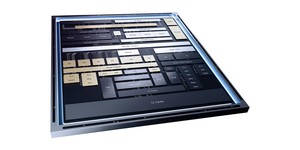
Intel has announced the Atom C3000 series, taking a chip family originally designed for palmtops and netbooks into the many-core era with up to 16 cores at the top end.
Announced back in 2008 as the launch name for the Silverthorne architecture, Intel's Atom chips were designed with 'Mobile Internet Devices' in mind. Boasting ultra-low power draws of between 0.6W and 2.5W in their original incarnation yet offering full 32-bit x86 compatibility, Intel saw the Atom family as driving forward a new era of pocketable internet access terminals - but, sadly, the launch of the smartphone era a year earlier and its focus on parts from rival ARM meant Intel's vision of the future never came to pass. Instead, the company would find a home for Atom chips in the short-lived netbook product category, attempt to shoe-horn them into smartphones only to be faced with a brick wall of ARM-based chips, and eventually shuffle the parts sideways into low-powered microservers, networking devices, and consumer electronics.
With this fresh market in mind, Intel has announced that it is considerably beefing the Atom family up with the impending launch of the Atom C3000 family - which includes a top-end part boasting 16 physical processing cores. Designed for high-throughput yet low-power devices like network attached storage and smart network switch systems as well as microservers, the 16-core Atom includes reliability, availability and serviceability (RAS) features previously exclusive to the company's server-centric Xeon range - something which may represent an attempt by the company to bring the Atom family out from the under the shadow of its recent device-bricking C2000 family erratum.
Based on the Denverton architecture, full specifications for Intel's 16-core Atom have not yet been released; instead, the only C3000-series family entry currently live on the company's ARK database is for the lower-end Atom C3338, a dual-core part running at 1.5GHz and boosting to 2.2GHz in a 9W thermal design profile (TDP) and able to address up to 64GB of DDR4 memory with optional ECC support in a single memory channel.
Announced back in 2008 as the launch name for the Silverthorne architecture, Intel's Atom chips were designed with 'Mobile Internet Devices' in mind. Boasting ultra-low power draws of between 0.6W and 2.5W in their original incarnation yet offering full 32-bit x86 compatibility, Intel saw the Atom family as driving forward a new era of pocketable internet access terminals - but, sadly, the launch of the smartphone era a year earlier and its focus on parts from rival ARM meant Intel's vision of the future never came to pass. Instead, the company would find a home for Atom chips in the short-lived netbook product category, attempt to shoe-horn them into smartphones only to be faced with a brick wall of ARM-based chips, and eventually shuffle the parts sideways into low-powered microservers, networking devices, and consumer electronics.
With this fresh market in mind, Intel has announced that it is considerably beefing the Atom family up with the impending launch of the Atom C3000 family - which includes a top-end part boasting 16 physical processing cores. Designed for high-throughput yet low-power devices like network attached storage and smart network switch systems as well as microservers, the 16-core Atom includes reliability, availability and serviceability (RAS) features previously exclusive to the company's server-centric Xeon range - something which may represent an attempt by the company to bring the Atom family out from the under the shadow of its recent device-bricking C2000 family erratum.
Based on the Denverton architecture, full specifications for Intel's 16-core Atom have not yet been released; instead, the only C3000-series family entry currently live on the company's ARK database is for the lower-end Atom C3338, a dual-core part running at 1.5GHz and boosting to 2.2GHz in a 9W thermal design profile (TDP) and able to address up to 64GB of DDR4 memory with optional ECC support in a single memory channel.

MSI MPG Velox 100R Chassis Review
October 14 2021 | 15:04








Want to comment? Please log in.